| Listing 1 - 10 of 13 | << page >> |
Sort by
|
Article
Abstract | Keywords | Export | Availability | Bookmark
 Loading...
Loading...Choose an application
- Reference Manager
- EndNote
- RefWorks (Direct export to RefWorks)
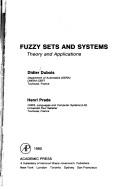
ISBN: 0122227506 9780122227509 9780080917726 0080917720 Year: 1980 Volume: 144 Publisher: New York Academic Press
Abstract | Keywords | Export | Availability | Bookmark
 Loading...
Loading...Choose an application
- Reference Manager
- EndNote
- RefWorks (Direct export to RefWorks)
Mathematical logic --- Ensembles flous. --- Systèmes flous. --- Fuzzy sets. --- Fuzzy systems. --- Fuzzy sets --- Fuzzy systems --- Ensembles flous --- Systèmes flous --- ELSEVIER-B EPUB-LIV-FT --- 681.3*I51 --- 681.3*I51 Models: deterministic; fuzzy set; geometric; statistical; structural (Patternrecognition) --- Models: deterministic; fuzzy set; geometric; statistical; structural (Patternrecognition) --- Systems, Fuzzy --- System analysis --- Fuzzy logic --- Sets, Fuzzy --- Fuzzy mathematics --- Set theory
Book
ISBN: 1282034685 9786612034688 0080917720 Year: 1980 Publisher: New York : Academic Press,
Abstract | Keywords | Export | Availability | Bookmark
 Loading...
Loading...Choose an application
- Reference Manager
- EndNote
- RefWorks (Direct export to RefWorks)
Fuzzy Sets and Systems
Fuzzy sets. --- Fuzzy systems. --- Systems, Fuzzy --- System analysis --- Fuzzy logic --- Sets, Fuzzy --- Fuzzy mathematics --- Set theory
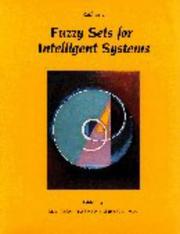
ISBN: 1558602577 Year: 1993 Publisher: San Mateo (Calif.) : Kaufmann,
Abstract | Keywords | Export | Availability | Bookmark
 Loading...
Loading...Choose an application
- Reference Manager
- EndNote
- RefWorks (Direct export to RefWorks)
Book
ISBN: 9781848903388 Year: 2021 Publisher: Rickmansworth College Publications
Abstract | Keywords | Export | Availability | Bookmark
 Loading...
Loading...Choose an application
- Reference Manager
- EndNote
- RefWorks (Direct export to RefWorks)
Book
ISBN: 3642147542 9786613476388 128347638X 3642147550 Year: 2010 Publisher: Berlin ; Heidelberg : Springer,
Abstract | Keywords | Export | Availability | Bookmark
 Loading...
Loading...Choose an application
- Reference Manager
- EndNote
- RefWorks (Direct export to RefWorks)
Spatial information is pervaded by uncertainty. Indeed, geographical data is often obtained by an imperfect interpretation of remote sensing images, while people attach ill-defined or ambiguous labels to places and their properties. As another example, medical images are often the result of measurements by imprecise sensors (e.g. MRI scans). Moreover, by processing spatial information in real-world applications, additional uncertainty is introduced, e.g. due to the use of interpolation/extrapolation techniques or to conflicts that are detected in an information fusion step. To the best of our knowledge, this book presents the first overview of spatial uncertainty which goes beyond the setting of geographical information systems. Uncertainty issues are especially addressed from a representation and reasoning point of view. In particular, the book consists of 14 chapters, which are clustered around three central topics. The first of these topics is about the uncertainty in meaning of linguistic descriptions of spatial scenes. Second, the issue of reasoning about spatial relations and dealing with inconsistency in information merging is studied. Finally, interpolation and prediction of spatial phenomena are investigated, both at the methodological level and from an application-oriented perspective. The concept of uncertainty by itself is understood in a broad sense, including both quantitative and more qualitative approaches, dealing with variability, epistemic uncertainty, as well as with vagueness of terms.
Geospatial data --- Fuzzy mathematics --- Errors, Scientific --- Geography --- Civil & Environmental Engineering --- Engineering & Applied Sciences --- Earth & Environmental Sciences --- Applied Mathematics --- Geography-General --- Civil Engineering --- Mathematical models --- Soft computing. --- Fuzzy sets. --- Sets, Fuzzy --- Engineering. --- Applied mathematics. --- Engineering mathematics. --- Appl.Mathematics/Computational Methods of Engineering. --- Set theory --- Cognitive computing --- Electronic data processing --- Computational intelligence --- Mathematical and Computational Engineering. --- Engineering --- Engineering analysis --- Mathematical analysis --- Mathematics
Book
ISBN: 3885852942 Year: 1986 Publisher: Köln : TÜV Rheinland,
Abstract | Keywords | Export | Availability | Bookmark
 Loading...
Loading...Choose an application
- Reference Manager
- EndNote
- RefWorks (Direct export to RefWorks)
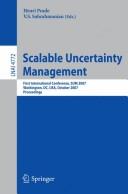
ISBN: 9783540754077 3540754075 3540754105 Year: 2007 Publisher: Berlin, Germany ; New York, New York : Springer,
Abstract | Keywords | Export | Availability | Bookmark
 Loading...
Loading...Choose an application
- Reference Manager
- EndNote
- RefWorks (Direct export to RefWorks)
Uncertainty (Information theory) --- Artificial intelligence --- Incertitude (Théorie de l'information) --- Intelligence artificielle --- Congresses. --- Congrès --- Computer Science --- Mechanical Engineering - General --- Mechanical Engineering --- Engineering & Applied Sciences --- Information Technology --- Artificial Intelligence --- Business. --- Management science. --- Mathematical logic. --- Artificial intelligence. --- Business and Management. --- Business and Management, general. --- Artificial Intelligence (incl. Robotics). --- Mathematical Logic and Formal Languages. --- AI (Artificial intelligence) --- Artificial thinking --- Electronic brains --- Intellectronics --- Intelligence, Artificial --- Intelligent machines --- Machine intelligence --- Thinking, Artificial --- Bionics --- Cognitive science --- Digital computer simulation --- Electronic data processing --- Logic machines --- Machine theory --- Self-organizing systems --- Simulation methods --- Fifth generation computers --- Neural computers --- Algebra of logic --- Logic, Universal --- Mathematical logic --- Symbolic and mathematical logic --- Symbolic logic --- Mathematics --- Algebra, Abstract --- Metamathematics --- Set theory --- Syllogism --- Quantitative business analysis --- Management --- Problem solving --- Operations research --- Statistical decision --- Trade --- Economics --- Commerce --- Industrial management --- Computer science. --- Artificial Intelligence. --- Informatics --- Science
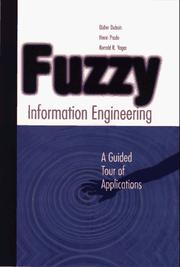
ISBN: 0471147664 Year: 1996 Publisher: New York Chichester Brisbane Wiley
Abstract | Keywords | Export | Availability | Bookmark
 Loading...
Loading...Choose an application
- Reference Manager
- EndNote
- RefWorks (Direct export to RefWorks)
Ensembles flous --- Fuzzy sets --- I/T --- ICT --- IT --- Informatietechnologie --- Information [Technologie de l'] --- Information technology --- Technologie de l'information --- Vage verzamelingen --- informatie- en communicatietechnologie --- Fuzzy sets. --- Information technology.
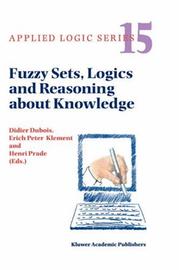
ISBN: 0792359771 Year: 1999 Publisher: Dordrecht : Kluwer academic,
Abstract | Keywords | Export | Availability | Bookmark
 Loading...
Loading...Choose an application
- Reference Manager
- EndNote
- RefWorks (Direct export to RefWorks)
Fuzzy Sets, Logics and Reasoning about Knowledge reports recent results concerning the genuinely logical aspects of fuzzy sets in relation to algebraic considerations, knowledge representation and commonsense reasoning. It takes a state-of-the-art look at multiple-valued and fuzzy set-based logics, in an artificial intelligence perspective. The papers, all of which are written by leading contributors in their respective fields, are grouped into four sections. The first section presents a panorama of many-valued logics in connection with fuzzy sets. The second explores algebraic foundations, with an emphasis on MV algebras. The third is devoted to approximate reasoning methods and similarity-based reasoning. The fourth explores connections between fuzzy knowledge representation, especially possibilistic logic and prioritized knowledge bases. Readership: Scholars and graduate students in logic, algebra, knowledge representation, and formal aspects of artificial intelligence.
| Listing 1 - 10 of 13 | << page >> |
Sort by
|

 Search
Search Feedback
Feedback About UniCat
About UniCat  Help
Help News
News